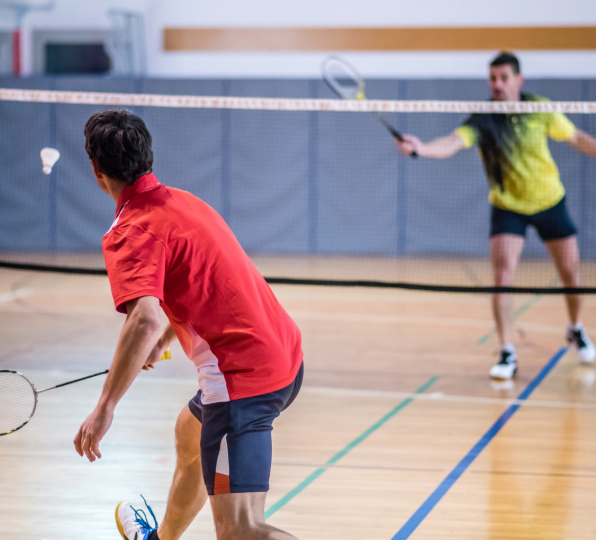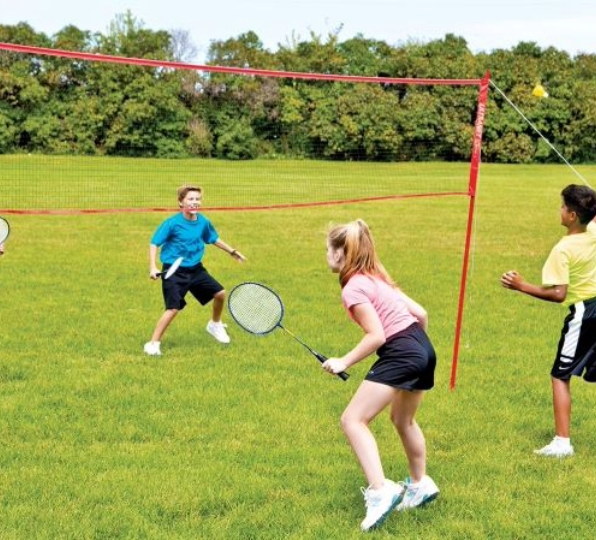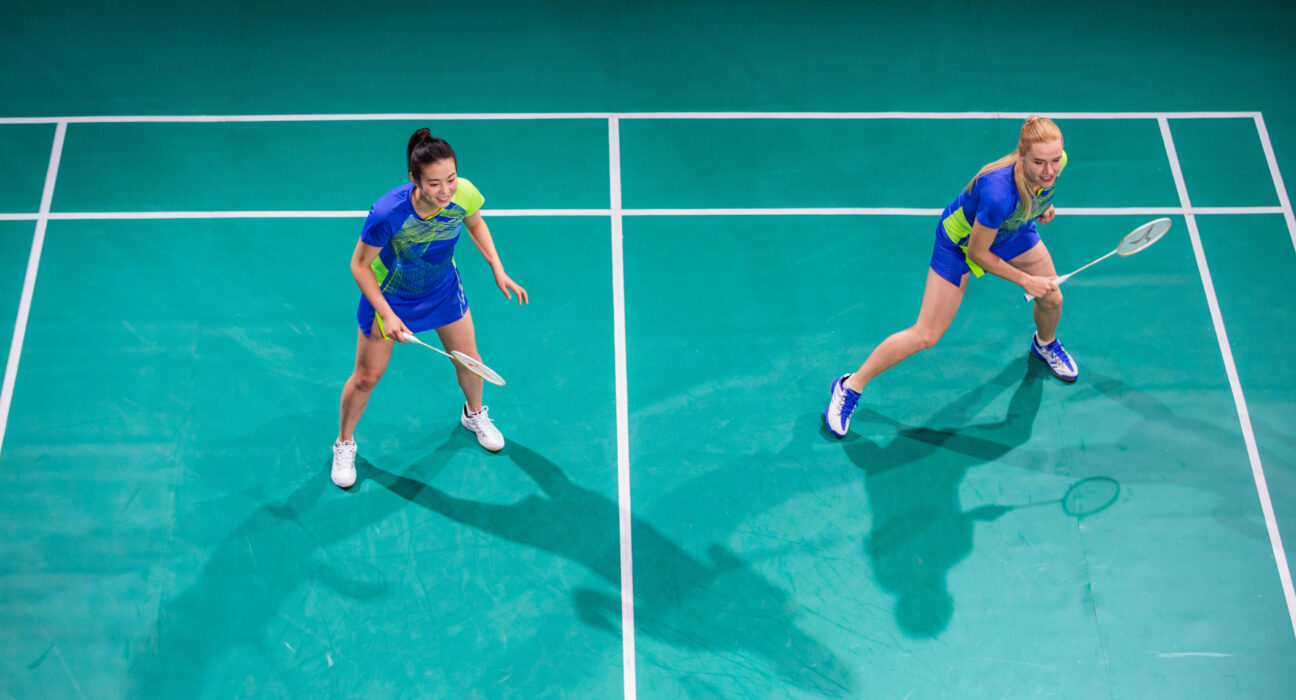Introduction:
Although it’s frequently thought of as a recreational sport or backyard hobby, badminton is much more than that. There are numerous health benefits associated with this dynamic sport that can enhance your mental and physical health. Let’s examine the many benefits of adding badminton to your exercise regimen, from improving cardiovascular health to elevating mood.
1. Cardiovascular Health
Engaging in badminton is not only a fun and enjoyable recreational activity but also a fantastic way to promote cardiovascular health. The dynamic nature of badminton involves constant movement, requiring players to sprint, jump, and change direction rapidly throughout the game. This level of activity elevates the heart rate, leading to a cardiovascular workout that can yield significant health benefits over time.
One of the primary benefits of playing badminton for cardiovascular health is the improvement in cardiovascular endurance. The intensity and duration of play challenge the cardiovascular system, gradually enhancing its capacity to deliver oxygen-rich blood to the muscles and organs. As players engage in rallies, shuttlecock exchanges, and court movement, their heart rate increases, forcing the heart to pump blood more efficiently. Over time, this leads to improvements in cardiovascular endurance, allowing individuals to sustain physical activity for longer periods without experiencing fatigue or shortness of breath.
Regular participation in badminton can also help lower the risk of developing various cardiovascular conditions, including heart disease, stroke, and hypertension. By engaging in aerobic exercise, such as badminton, individuals strengthen their heart muscle, improve blood circulation, and lower blood pressure levels. The repetitive movements involved in badminton, such as lunging, jumping, and overhead strokes, promote blood flow throughout the body, reducing the buildup of plaque in the arteries and lowering the risk of blockages that can lead to heart attacks and strokes.
Moreover, badminton offers a comprehensive cardiovascular workout that targets multiple muscle groups simultaneously. Players utilize their legs for agility and speed, their arms for striking the shuttlecock, and their core muscles for stability and balance. This full-body workout not only improves cardiovascular health but also enhances overall muscular strength, endurance, and flexibility.
Another significant benefit of badminton for cardiovascular health is its potential to boost mood and mental well-being. Engaging in regular physical activity, such as badminton, stimulates the release of endorphins, neurotransmitters that promote feelings of happiness and relaxation. Additionally, participating in a social sport like badminton can provide social interaction, camaraderie, and a sense of belonging, all of which contribute to improved mental health and reduced stress levels.
2. Weight Management
Badminton is not only a thrilling sport but also an effective calorie-burning activity, making it an excellent choice for individuals looking to manage their weight and improve their overall fitness. Whether played casually or competitively, badminton offers a dynamic workout that engages multiple muscle groups and elevates the heart rate, resulting in significant calorie expenditure.
One of the key benefits of playing badminton for weight management is its high calorie-burning potential. A singles match can burn anywhere from 300 to 450 calories per hour, depending on factors such as intensity, duration, and individual body composition. Doubles matches, which involve more movement and coordination between players, can burn even more calories. By participating in regular badminton sessions, individuals can create a calorie deficit, which is essential for weight loss or weight maintenance.
The intense and fast-paced nature of badminton requires constant movement and agility, leading to increased energy expenditure and fat burning. Players engage in a variety of movements, including running, jumping, lunging, and striking, which target different muscle groups and elevate the heart rate. This combination of aerobic and anaerobic exercise helps boost metabolism, allowing individuals to burn calories both during and after their badminton sessions.
Moreover, badminton offers a fun and enjoyable way to stay active, making it easier to adhere to a regular exercise routine. Unlike traditional workouts that may feel monotonous or repetitive, playing badminton allows individuals to immerse themselves in the excitement of the game while reaping the physical benefits. Whether playing with friends, family members, or teammates, the social aspect of badminton can further enhance motivation and adherence to an active lifestyle.
In addition to burning calories and promoting weight loss, playing badminton can also improve body composition by building lean muscle mass and reducing body fat percentage. The dynamic movements and explosive bursts of energy required in badminton help sculpt and tone muscles throughout the body, leading to a more defined and athletic physique.
Furthermore, regular participation in badminton can have positive effects on overall health and well-being, including improved cardiovascular health, increased stamina, and enhanced mental clarity. By incorporating badminton into a well-rounded fitness regimen that includes strength training, flexibility exercises, and proper nutrition, individuals can achieve their weight management goals while enjoying the many benefits of an active lifestyle.
3.Improved Agility and Reflexes
Badminton is renowned for its fast-paced and dynamic gameplay, which makes it an excellent sport for improving agility, speed, and reflexes. The rapid-fire nature of the game requires players to react swiftly to incoming shots, anticipate their opponents’ moves, and adjust their positioning on the court accordingly. These quick and precise movements not only enhance physical coordination but also sharpen cognitive skills, leading to improvements in overall reaction time and agility.
One of the primary ways badminton enhances agility is through its requirement for rapid changes in direction and movement patterns. Players must constantly shift their position on the court to reach incoming shots, execute shots with accuracy, and maintain a strategic advantage over their opponents. This constant movement challenges the body to adapt quickly to changing circumstances, improving agility and nimbleness over time.
In addition to agility, badminton also helps develop speed, particularly in terms of footwork and reaction time. Players must move quickly across the court to cover ground efficiently, reach shuttlecocks before they land, and return shots with precision. This combination of speed and footwork training not only improves players’ ability to move swiftly but also enhances their overall athleticism and endurance.
Furthermore, badminton hones reflexes through its fast-paced rallies and split-second decision-making. Players must react instantaneously to the trajectory and speed of incoming shots, adjusting their racket position and body positioning to return the shuttlecock effectively. This constant stimulation of the reflexes helps improve reaction time and hand-eye coordination, which are essential skills not only in badminton but also in various other sports and activities.
Moreover, the cognitive demands of badminton contribute to improvements in mental agility and processing speed. Players must anticipate their opponents’ shots, strategize their own movements, and make split-second decisions under pressure. This mental stimulation challenges the brain to think quickly and adaptively, leading to improvements in cognitive function and decision-making abilities.
Overall, the fast-paced nature of badminton provides an ideal environment for honing agility, speed, and reflexes. Through consistent practice and gameplay, players can enhance their physical coordination, cognitive skills, and overall athleticism, leading to improved performance on the court and in various other areas of life. Whether played recreationally or competitively, badminton offers a fun and effective way to develop agility, speed, and reflexes while enjoying the thrill of the game.
4.Muscle Strength and Endurance
Badminton is not just a fast-paced and exhilarating sport; it’s also an excellent way to build muscle strength and endurance. This dynamic activity engages multiple muscle groups throughout the body, including the legs, arms, core, and back, through a combination of swinging the racket, lunging, jumping, and rapid movements across the court. The repetitive nature of these motions helps to build muscular strength and endurance over time, leading to a range of physical benefits.
One of the primary muscle groups engaged in badminton is the lower body, particularly the legs. The constant movement and agility required in badminton involve frequent lunging, jumping, and pivoting, which target the quadriceps, hamstrings, calves, and glutes. These dynamic movements not only strengthen the leg muscles but also improve balance, stability, and coordination, essential for performing quick directional changes and explosive movements on the court.
Additionally, the upper body muscles are heavily involved in badminton, primarily through the swinging motion of the racket. The muscles of the arms, shoulders, chest, and back are activated during overhead shots, smashes, clears, and defensive strokes. The repetitive nature of these swinging motions helps to build strength and endurance in the upper body muscles, leading to improved racket control, power, and accuracy.
Furthermore, badminton engages the core muscles, including the abdominals, obliques, and lower back muscles, to provide stability and support during movements and shots. A strong core is essential for maintaining proper posture, balance, and control on the court, as well as transferring power and energy efficiently between the upper and lower body. By incorporating core-strengthening exercises into their training routine, badminton players can improve their overall performance and reduce the risk of injury.
In addition to building muscle strength, badminton also improves muscular endurance, allowing players to sustain physical activity for longer periods without experiencing fatigue. The fast-paced rallies, quick movements, and continuous play challenge the muscles to perform repetitive actions over extended periods, gradually increasing their endurance capacity. Improved muscular endurance not only enhances athletic performance on the court but also translates to better stamina and resilience in daily activities and other sports.
5.Stress Relief and Mental Well-being
Playing badminton offers not only physical benefits but also significant advantages for stress relief and mental well-being. As a form of exercise, badminton triggers the release of endorphins, neurotransmitters in the brain known as “feel-good” hormones. These endorphins promote feelings of happiness and euphoria while reducing stress and anxiety levels. Thus, engaging in regular badminton sessions can be an effective way to alleviate stress and enhance mental well-being.
The physical activity involved in playing badminton provides an outlet for pent-up energy and tension, allowing individuals to release stress and unwind. The fast-paced nature of the game requires players to focus their attention on the task at hand, diverting their thoughts away from everyday worries and concerns. As a result, badminton serves as a form of active meditation, promoting mindfulness and relaxation.
Moreover, the social aspect of badminton can further contribute to stress relief and mental well-being. Whether playing casually with friends or participating in organized leagues and tournaments, badminton offers opportunities for social interaction and camaraderie. Spending time with others who share a common interest in the sport can foster a sense of belonging and connection, reducing feelings of loneliness and isolation.
Participating in badminton also provides an opportunity to take a break from the demands of daily life and focus on the present moment. The friendly competition and teamwork involved in badminton can be exhilarating and uplifting, boosting mood and morale. Additionally, the sense of accomplishment that comes from mastering new skills and improving performance on the court can enhance self-esteem and self-confidence.
Furthermore, regular physical activity, such as playing badminton, has been shown to have long-term benefits for mental health. Research indicates that exercise can help reduce symptoms of depression and anxiety, improve cognitive function, and enhance overall quality of life. By incorporating badminton into a balanced lifestyle that includes proper nutrition, adequate sleep, and stress management techniques, individuals can support their mental well-being and resilience to life’s challenges.
6. Enhanced Flexibility
Engaging in badminton offers numerous advantages for enhancing flexibility, a crucial component of overall physical fitness and well-being. The sport involves a diverse range of movements that challenge different muscle groups and joints, ultimately promoting flexibility and joint mobility throughout the body. Whether reaching for overhead smashes, bending low for drop shots, or quickly changing direction on the court, badminton requires players to move through a variety of positions, encouraging flexibility and adaptability.
One of the primary ways badminton promotes flexibility is through its emphasis on dynamic stretching and full range of motion movements. Players constantly extend and contract their muscles as they execute various shots and movements on the court, helping to improve flexibility and joint mobility over time. Regular participation in badminton encourages the body to adapt to these dynamic movements, leading to greater flexibility and agility both on and off the court.
Moreover, badminton helps improve flexibility by targeting key muscle groups and joints involved in the sport’s movements. The explosive nature of badminton requires players to engage muscles throughout the body, including the legs, hips, arms, shoulders, and core. By repeatedly stretching and contracting these muscles during gameplay, individuals can enhance their flexibility and range of motion, reducing the risk of injuries and enhancing overall functional movement.
In addition to promoting flexibility, badminton encourages proper alignment and posture, which are essential for maintaining joint health and preventing injuries. As players move across the court and execute shots, they must maintain proper body mechanics and alignment to generate power and control. This focus on body awareness and alignment helps improve posture and biomechanics, reducing the strain on muscles and joints and promoting overall joint health.
Furthermore, incorporating stretching exercises before and after playing badminton can further enhance flexibility and prevent muscle tightness. Pre-game stretching helps warm up the muscles and prepare them for the demands of play, while post-game stretching helps cool down the muscles and promote recovery. By incorporating a variety of stretching techniques, such as static stretching, dynamic stretching, and proprioceptive neuromuscular facilitation (PNF) stretching, players can improve flexibility and reduce the risk of muscle imbalances and injuries.
7. Longevity and Quality of Life
Regular participation in badminton can significantly impact longevity and enhance the quality of life in numerous ways. By promoting cardiovascular health, maintaining a healthy weight, and improving overall fitness, individuals who engage in badminton on a regular basis can enjoy a longer, healthier life with improved vitality and well-being.
One of the key benefits of playing badminton is its positive effect on cardiovascular health. The fast-paced nature of the sport elevates heart rate and improves blood circulation, leading to a stronger and more efficient cardiovascular system. Regular cardiovascular exercise, such as badminton, helps reduce the risk of heart disease, stroke, and other cardiovascular conditions by lowering blood pressure, improving cholesterol levels, and enhancing overall heart function.
Additionally, badminton serves as an effective means of maintaining a healthy weight and body composition. The high-intensity nature of the game burns a significant number of calories, helping individuals to achieve and maintain a healthy weight range. By engaging in regular physical activity like badminton, individuals can manage their weight, reduce excess body fat, and lower their risk of obesity-related diseases such as type 2 diabetes and certain types of cancer.
Moreover, the overall improvement in fitness and physical well-being resulting from regular participation in badminton contributes to enhanced longevity and quality of life. Stronger muscles, improved flexibility, and better endurance allow individuals to perform daily activities with greater ease and efficiency, reducing the risk of injury and enhancing overall functional capacity.
Furthermore, the social aspect of badminton plays a crucial role in promoting longevity and well-being. Whether playing with friends, family members, or fellow enthusiasts, badminton provides opportunities for social interaction, camaraderie, and support. Building and maintaining social connections through sports like badminton have been linked to better mental health, lower stress levels, and improved overall happiness and life satisfaction.
Additionally, the mental stimulation and cognitive benefits of badminton can contribute to enhanced longevity and quality of life. Engaging in strategic gameplay, problem-solving, and decision-making on the badminton court stimulate the brain and help maintain cognitive function as individuals age. Studies have shown that regular physical activity, including badminton, can help reduce the risk of cognitive decline and age-related cognitive disorders such as dementia and Alzheimer’s disease.


Conclusion:
Badminton offers a myriad of health benefits, making it much more than just a recreational sport. From cardiovascular fitness and weight management to improved agility and mental well-being, the advantages of playing badminton extend far beyond the court. So, grab a racket, rally with friends, and experience the transformative effects of this dynamic sport on your health and happiness.












